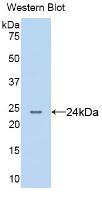Monoclonal Antibody to Anterior Gradient 2 (AGR2) 

GOB4; HAG2; XAG2; AG2; PDIA17; HPC8; Anterior Gradient Protein 2; Protein Disulfide Isomerase Family A,Member 17; Secreted cement gland protein XAG-2 homolog
Overview
Properties
- Product No.MAC285Hu21
- Organism SpeciesHomo sapiens (Human) Same name, Different species.
- ApplicationsWB; IHC; ICC; IP.
If the antibody is used in flow cytometry, please check FCM antibodies.
Research use only - DownloadInstruction Manual
- CategoryTumor immunityReproductive scienceBone metabolism
- SourceMonoclonal antibody preparation, Host Mouse
- Ig Isotype IgG, Clone Number n/a
- PurificationAntigen-specific affinity chromatography followed by Protein A affinity chromatography
- LabelNone
- Immunogen n/a
- Buffer FormulationPBS, pH7.4, containing 0.02% NaN3, 50% glycerol.
- TraitsLiquid, Concentration 1mg/mL
Sign into your account
Share a new citation as an author
Upload your experimental result
Review

Contact us
Please fill in the blank.
Specifity
The antibody is a mouse monoclonal antibody raised against AGR2. It has been selected for its ability to recognize AGR2 in immunohistochemical staining and western blotting.
Usage
Western blotting: 0.2-2µg/mL;1:500-5000
Immunohistochemistry: 5-20µg/mL;1:50-200
Immunocytochemistry: 5-20µg/mL;1:50-200
Optimal working dilutions must be determined by end user.
Storage
Store at 4°C for frequent use. Stored at -20°C in a manual defrost freezer for two year without detectable loss of activity. Avoid repeated freeze-thaw cycles.
Stability
The thermal stability is described by the loss rate. The loss rate was determined by accelerated thermal degradation test, that is, incubate the protein at 37°C for 48h, and no obvious degradation and precipitation were observed. The loss rate is less than 5% within the expiration date under appropriate storage condition.
Giveaways
Increment services
-
 Antibody Labeling Customized Service
Antibody Labeling Customized Service
-
 Protein A/G Purification Column
Protein A/G Purification Column
-
 Staining Solution for Cells and Tissue
Staining Solution for Cells and Tissue
-
 Positive Control for Antibody
Positive Control for Antibody
-
 Tissue/Sections Customized Service
Tissue/Sections Customized Service
-
 Phosphorylated Antibody Customized Service
Phosphorylated Antibody Customized Service
-
 Western Blot (WB) Experiment Service
Western Blot (WB) Experiment Service
-
 Immunohistochemistry (IHC) Experiment Service
Immunohistochemistry (IHC) Experiment Service
-
 Immunocytochemistry (ICC) Experiment Service
Immunocytochemistry (ICC) Experiment Service
-
 Flow Cytometry (FCM) Experiment Service
Flow Cytometry (FCM) Experiment Service
-
 Immunoprecipitation (IP) Experiment Service
Immunoprecipitation (IP) Experiment Service
-
 Immunofluorescence (IF) Experiment Service
Immunofluorescence (IF) Experiment Service
-
 Buffer
Buffer
-
 DAB Chromogen Kit
DAB Chromogen Kit
-
 SABC Kit
SABC Kit
-
 Long-arm Biotin Labeling Kit
Long-arm Biotin Labeling Kit
-
 Real Time PCR Experimental Service
Real Time PCR Experimental Service
Citations
- Serum AGR2 as an early diagnostic and postoperative prognostic biomarker of human lung adenocarcinomaMetaPress: n7137r6271u54118
- Integrated Proteomic Profiling of Cell Line Conditioned Media and Pancreatic Juice for the Identification of Pancreatic Cancer BiomarkersPubMed: PMC3205865
- Anterior gradient 2 (AGR2): blood-based biomarker elevated in metastatic prostate cancer associated with the neuroendocrine phenotypePubmed: 22911164
- Validation of four candidate pancreatic cancer serological biomarkers that improve the performance of CA19.9Pubmed: 24007603
- Validation of Biomarkers That Complement CA19.9 in Detecting Early Pancreatic CancerPubmed:25239611
- AGR3 in Breast Cancer: Prognostic Impact and Suitable Serum-Based Biomarker for Early Cancer DetectionPubMed: 25875093
- Serum AGR2 as a useful biomarker for pituitary adenomasS0303846717300045
- Identification, characterization and application of a new peptide against anterior gradient homolog 2 (AGR2)Pubmed:29937991
- Anterior gradient protein 2 is a marker of tumor aggressiveness in breast cancer and favors chemotherapy‑induced senescence escape34913074
- Proteome profiling of enzalutamide‐resistant cell lines and serum analysis identified ALCAM as marker of resistance in castration‐resistant prostate cancerPubmed:35689436










